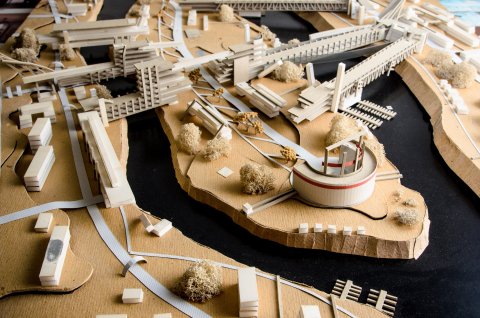Profession of a design engineer is not only related with designing of high-rise constructions. Specialists of this sphere also carry out designing of linear constructions: railroads and highways, tram lines, pipelines, gas pipelines, power transmission lines, and many others.

Deputy Director of the Institute of Architecture and Construction, Senior Lecturer of the Department of Architecture, Vasiliy Bolshakov graduated from the Faculty of Architecture’s Department of Urban Planning and Landscape Architecture, and now he teaches Architectural Design at SUSU.
– When did you become interested in architecture?
− I have liked engineering design since childhood. My first drawings were cities which I drawn in notebooks and notepads. At the Department of Town Planning, Engineering Systems and Networks, to where I got enrolled after high school, it was very important to be able to paint and draw well, i.e. demonstrate both artistic and engineering abilities.
– What knowledge and abilities one should have for getting enrolled at the Department of Town Planning, Engineering Systems and Networks?
− In order to get enrolled at our specialty, a good background training is required. At the university, there is a program for one-year training for getting admission to the Institute of Architecture and Construction. Itincludes artistic and chart drawings. By the results of the training applicants undertake an exam and only afterwards they can get an admission. Without the admission, it is very difficult to get enrolled at the Department. Aside from the main examination subjects, there is also an art contest which is held at the university as well. It includes drawing of a head made of gypsum and a composition made of geometrical figures.
– What knowledge do students of the Department of Town Planning, Engineering Systems and Networks get?
− Our Institute of Architecture and Construction, in particular the Department of Town Planning, Engineering Systems and Networks teaches students how to perform designing of cities, not only buildings but also the infrastructure: highways, engineering systems and many other things; this means we are designing material environment.
– How did your studying go?
− In order to learn something, you need to make a lot of efforts; only then you can become a professional. During the third year of study we had the subject called Structural Mechanics. This subject helps many students realize whether the chosen specialty is “yours thing” or not. This is a difficult subject because architects are creative people and technical subjects are comparatively difficult for them. Personally, I passed that exam and, despite all difficulties of studying, I realized that I like doing design engineering.
– Why did you decide to go for master’s degree study?
− After finishing specialist’s study, I decided to continue my studying; first of all, because I had an interest in my diploma project, and second, because I wanted to try myself as a teacher.
At the moment, I anticipate defense of the dissertation whose topic is concerning the problems of development of the Chelyabinsk agglomeration.
– In your opinion, what are the features of teaching activity?
− Being a teacher is a big responsibility. When you are a practitioner – you set a certain engineering task and complete it. But when you are a teacher, it’s like each time you are passing some kind of exam for you professional competency. If a student asks you a tricky question and you can’t answer it, it rings a bell about the necessity to find this information. You need to know a lot in order to not only deliver a lecture, but also captivate student’s interest; this is very important.
In my opinion, it is important for a teacher to remember that we are the influence on the future generation not only in the sphere of professional education, but also in the sphere of common human concepts which we indirectly pass to students in the process of collaborative work. I am very happy to see my graduates holding high positions in ministries, project institutes, abroad. It is nice to know that they found their way and are working by their profession.





